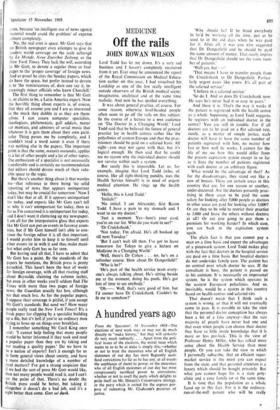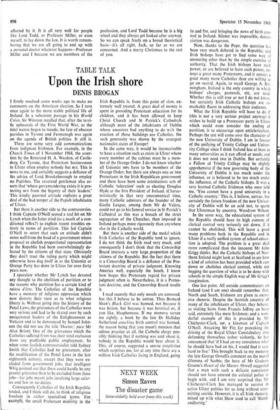Off the rails
MEDICINE JOHN ROWAN WILSON
Lord Todd has let me down. It's a very sad business and I haven't completely recovered from it yet. Ever since he announced the report of the Royal Commission on Medical Educa- tion earlier on this year, I had visualised his Lordship as one of the few really intelligent outside observers of the British medical scene; imaginative, analytical and at the same time realistic. And now he has spoiled everything.
It was about general practice, of course. For some reason, otherwise level-headed people often seem to go off the rails on this subject. In the course of a lecture to a BMA audience on 'The Doctor in a Changing World,' Lord Todd said that he believed the future of general practice lay in health centres rather like the polyclinics of eastern Europe and that the prac- titioners should be paid on a salaried basis. All right—you may not agree with that, but it's logical enough. He then said that he could see no reason why the individual doctor should not survive within such a system.
But surely this is impossible. Let us, for example, imagine that Lord Todd (who, of course, like all right-thinking pundits, uses the Health Service himself) is in need of urgent medical attention. He rings up the health centre.
`Hello, this is Lord Todd.'
'Initials?'
'No initial. I am Alexander, first Baron Todd. I _have a pain in my stomach and want to see my doctor.'
'Just a moment. Yes—here's your card, you're on our list. Who do you want to see?' 'Dr Cruickshank.'
`Not today, I'm afraid. He's all booked up till next Tuesday.'
`But I can't wait till then. I've got to leave tomorrow for Tokyo to give a lecture on Medicine in a Changing World.'
`Well, there's Dr Cohen . . . no, he's on a refresher course. How about Dr Dangerfield?' 'Who is he?'
`He's part of the health service team every- one's always talking about. He's sitting beside me at the moment, doing his pools. He's got lots of time to see anybody.
'Oh—. Well, that's very good of him, but I'd sooner have Dr Cruickshank. Couldn't he fit me in somehow?'
'Why should he? If he fitted everybody in he'd be working all the time, just as he used to in the old days when he was paid for it. After all, it was you who suggested that Dr Dangerfield and he should be paid the same amount of money. That surely implies that Dr Dangertield should see the same num- ber of patients.'
'Well yes, but—' 'That means I have to transfer people from Dr Cruickshank to Dr Dangerfield. Particu- larly urgent cases like yours. It's all part of the salaried service.'
'I believe in a salaried service.'
'So do I. And so does Dr Cruickshank now. He says he's never had it so easy in years.'
And there it is. That's the way it works if the patient is registered with the health centre as a whole. Supposing, as Lord Todd suggests, he registers with an individual doctor in the centre? You are still in trouble. For if all doctors are to be paid on a flat salaried rate, surely, as a matter of simple justice, each doctor will have to have the same number of patients registered with him, no matter how fast or how well he works. I cannot for the life of me see how this would differ from the present capitation system except in so far as it fixes the number of patients registered with each doctor at an arbitrary figure.
What would be the advantage of that? As for the disadvantages, they stand out like a row of houses. There are certain areas in this country that are, for one reason or another, under-doctored. Are the doctors presently prac- tising in these areas to be paid the same salary for looking after 5,000 people as doctors in other areas are paid for looking after 3,000? Or are they to be told to restrict their practice to 3,000 and leave the others without doctors .at all? Or are you going to pay them a premium for working harder? In which case, you are back to the capitation system again.
The plain fact is that you cannot pay a man on a time basis and expect the advantages of a piecework system. Lord Todd makes play with the fact that doctors in the hospital service are paid on a time basis. But hospital doctors do not undertake family care. The patient has no control over which doctor he sees. If the consultant is busy, the patient is passed on to his assistant. It is necessarily an impersonal system. So is the system which operates in the eastern European polyclinics. And so, inevitably, would be a system in this country based on health centres and salaried cps.
That doesn't mean that I think such a system is wrong, or that it will not eventually come to pass. It is possible to take the view that the personal doctor conception has always been a bit of a fake anyway—that the vast majority of people have never had one and that even when people can choose their doctor they have so little inside knowledge that it is more or less pot-luck. This is the view of Professor Henry Miller, who has talked more sense about the Health Service than most people. Or you can take the view to which I personally subscribe, that an efficient super- market service is the most you can expect from the state, and that personal attention is a luxury which should be bought privately. But what you cannot hope for iS a state poly- clinic and a cosy family GP at the same time.
It is time that the population as a whole faced up to this fact. For it is the ordinary, run-of-the-mill patient who will be really affected by it. It is all very well for people like Lord Todd, or Professor Miller, or even myself, to lay down the law. It is worth remem- bering that we are all going to end up with a personal doctor whatever happens—Professor Miller and I because we are members of the profession, and Lord Todd because he is a big wheel and they always get looked after anyway. So we can speak freely on a broad theoretical basis—it's all right, Jack, so far as we are concerned. And a merry Christmas to the rest of you.







































 Previous page
Previous page